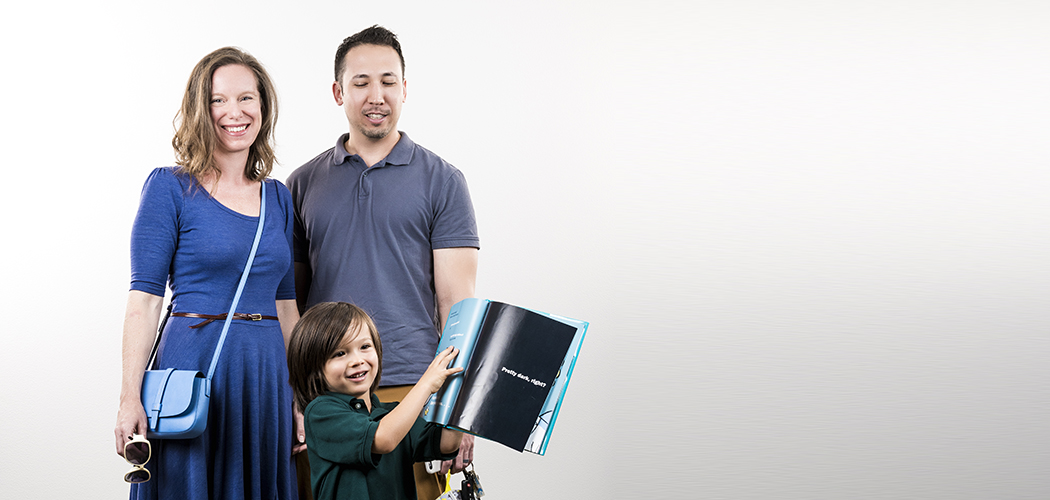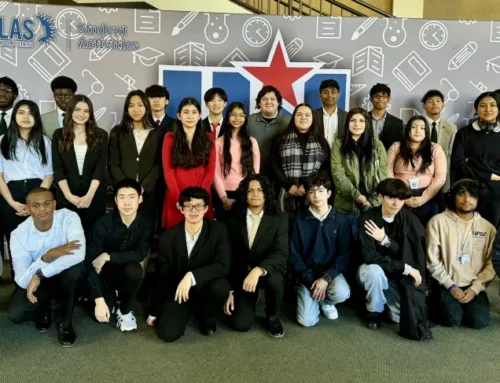In this episode of The Uninformed Parent, I circled back to Denise Rappmund, whose story began this podcast series Choosing where her son would start his education was an anxiety-filled decision for her, as it is for many parents. Now, a year after enrolling him at Hogg Elementary, Rappmund reflects on the PTA, the dual language program and why Hogg was a great fit. Her family will relocate to New Mexico for her son’s first-grade year, but her short and sweet Dallas ISD experience informs her school search in a new place.
Keri Mitchell: So tell me a moment this year that made you feel like, “Yes, this is the right thing. We did the right thing.”
Denise Rappmund: Well, I guess. Earlier on in the year, we got word from his teacher, from my son’s teacher, that he was having trouble with a special needs child at the school. So my son is really young. He’s five, and kids at that age are learning how to be around a lot of different, you know, people and how to make friendships and just how to be socialized. At Hogg, where he’s going to school, there’s a large deaf student population. This one student, who’s probably around his age, is deaf and has some other issues that he’s dealing with and has an aid with him all the time. I think, because that student is learning how to communicate, I guess he was scaring my son, which sounds terrible. We were mortified, but at the same time, the teacher said, “Can you can you talk to him? Work with him? This student is getting scared and running away, and then it’s just kind of making the problem worse.” And so we talked to him a lot about, you know, that this child probably just wants to be friends with him and different ways to try to communicate with him with his hands. With that and then support of the teachers, they were able to work it out, able to have some simple communication and then became friends. That was heartwarming to me, but the surprise was that wasn’t, that wasn’t something I was thinking about when the year started. I wasn’t thinking about that as a growth opportunity, that that was even present. That was a moment earlier on in the year where I thought, “Oh, yeah, we made the right decision. This is great. This is an added opportunity.” In the public school system, the the schools are there to support all children. So you’re going to get an an array of children. People tend to talk about, you know, the cultural and economic differences, but then I hadn’t been thinking as much about other differences as well. I thought, you know, “That’s really cool.”
Keri Mitchell: That’s great. So, at the beginning of the year, this was a journey that you were excited about but unsure about. There was a lot you didn’t know, but a lot of things that you had kind of researched on your own and found out and felt confident enough to send your son there. You have some friends, too, or people that you knew who were also going to do the same. What were moments, I guess, maybe in the first few months of the first semester that kind of popped out at you as like, “Oh, this is interesting, or this is what I expected. This wasn’t this isn’t what I expected.”?
Denise Rappmund: The group of engaged parents was actually larger than I had expected. They made it clear early on that they wanted to be part of the PTO, and they wanted to be part of the site based decision making committee.
Keri Mitchell: Was there already an established PTO at Hogg?
Denise Rappmund: Yeah, they’d gotten it going again, maybe it’s three years ago now. So, there was a husband and wife that we’re sort of doing everything with the principal. I know, they were very excited to see some additional new blood that wanted to work with them.
Keri Mitchell: How many families ended up kind of being engaged with the PTO this year? How many people are we talking about?
Denise Rappmund: Probably a handful.
Keri Mitchell: Yeah, handful. And it’s a school of about 400-ish, somewhere around there. Is that right?
Denise Rappmund: 250, give or take.
Keri Mitchell: Oh, your school’s 250. What did you feel like you were able to work together and do as a PTO this year?
Denise Rappmund: I think because the the husband and wife had gotten things going and because they had the additional help. We did a number of these outdoor movie nights, which was really fun. The art teacher has a movie, a large screen that she puts up on one of the portable buildings outside for a movie, but then we would sell, you know, food and stuff like that. The most successful one was actually, one of the moms, her mother, I think is from Colombia, and is a really good cook, and made a bunch of homemade fajita, you know, traditional rice and beans and everything and brought that and I think that was the most successful, you know, fundraising event that they’ve had so far at this school. So that was really great. They did in a fundraiser with In-and-Out and Peter Piper Pizza, but it’s just kind of building on itself. I think there’s some good momentum now.
Keri Mitchell: That’s good. What are you guys raising funds for?
Denise Rappmund: You know, that’s a hard one. I think, you know, for a successful fundraiser, it’s good to pinpoint what the need actually is. What I’ve noticed with, you know, some of these public schools that don’t have the big huge PTA, everything, lots of fundraising, is that I think the administration is sort of overwhelmed with their needs. So they just kind of are vague. “We need everything,” and to try to get them to be specific, you have to kind of press. I know that there’s a constant need for paper, because one of the things that we were able to find out from digging is that they run out of paper, like sometime midway through the year. Field trips, so there’s really not a budget for field trips. It’s really from fundraising, and donations, or nonprofits, that they can go on field trips at all. It’s really important for the kids, especially the kids that don’t have the opportunities to go out and do some of these things with their families. They don’t have a working laminating machine that’s like reliable for the teachers. There’s some things that teachers are still paying for themselves: reading programs and that sort of thing. So, it’s pretty basic.
Keri Mitchell: Did that surprise you?
Denise Rappmund: A little bit. “Public schools are short on funds,” is thrown around a lot. But I again, I didn’t quite know what that meant. The first time I heard the principal say that they run out of paper, that was pretty shocking, because that seems so fundamental. I do wish that, I don’t know if it would be the principals or the Board of Trustees or Superintendent or whomever, was a little more explicit about what they need. I wish they were more explicit with the community generally. I think that would maybe make fundraising efforts a little more successful, especially for the schools that don’t already have large parent support system.
Keri Mitchell: I’m not sure if you’ve had this experience, but as I’ve dug into a school, sometimes it feels like…it’s an onion. You’re peeling off one layer, and then, “Oh, man, there’s a whole lot more underneath here.” So it does kind of take that time and effort and persistence to just kind of keep peeling the onion layers off to think, “Okay, what are our needs? What do we really need? What are we really going for here?” At the end of the year, do you feel like, “This is what we accomplished, and it was a really big deal issue”? Do you feel like the momentum that will continue on into the next few years is really what it’s about?
Denise Rappmund: I think it’s the momentum. Yeah, I mean, for so many of us, where it was our first year coming in, you know, in a way we were there to try to help but observe. Maybe next year is the year where you have something even bigger happen.
Keri Mitchell: Are there ways you expected to pitch in and help that you found that you didn’t need to?
Denise Rappmund: No, it’s really a daunting. I mean, it’s great but you know.
Keri Mitchell: No, but I mean. Yeah, I wanted honesty. It’s not as if you’re, you’re scot free in any, you know, account.
Denise Rappmund: I felt like, you know, there were times when I wanted to do something and I couldn’t, because I was traveling for work or something like that. But at every opportunity, every moment, I was like, “I should be there. I’ve got to be there.” Because you feel like, you know, people are really counting on you. You know, it’s not like when you have a huge herd, you’re like, “Well, you know, so-and-so will do it. You don’t have as much of that.
Keri Mitchell: Was that exhausting?
Denise Rappmund: Sometimes, but I still feel like it’s just the right thing to do, you know? I think as people we generally get a sense of personal happiness when we put the focus on somebody else.
Keri Mitchell: There’s energy that comes from purpose.
Denise Rappmund: Yeah.
Keri Mitchell: What were other kind of either surprising, or just poignant moments for you throughout the year?
Denise Rappmund: Just the rigor of kindergarten.
Keri Mitchell: Sure.
Denise Rappmund: So I had been told by people that kindergarten was really pretty hardcore now, and it is.
Keri Mitchell: What does that mean like, they’re not just singing the ABC song in class?
Denise Rappmund: No, my son was in the dual language immersion kindergarten this year, and starting the second week, he had spelling words and spelling test every Friday, all Spanish words. He had homework Monday through Thursday, not, you know, an hour or whatever, probably 10 minutes or something like that, for kindergarten. Nonetheless, you know, practicing the spelling words, writing sentences. Sometimes there might be a math worksheet or something like that in there. So I thought that was pretty intense, and then there’s no naps anymore in kindergarten. That was hard on my son, and I did hear from other parents that that was a little hard on their kids. There’s no downtime. It’s very packed and intense. They expect a lot from these kids. Some of the kids come in to class having never been to school before, but they still have those same expectations on them, that are on my son who’s been in school since he was eight months old. It’s pretty intense.
Keri Mitchell: Was that encouraging to you to know that it was that intense or more daunting?
Denise Rappmund: I think it’s a little much for that age. I mean, what’s the point? What they say is everything keeps getting pushed down to younger and younger ages for school readiness. They want these kids to succeed throughout their educational careers. They have testing tied to funding and that sort of thing. That’s all kind of going on outside. They’re are little kids. I think it’s unfortunate, but, you know, my son did fine. So it’s okay.
Keri Mitchell: What did he learn?
Denise Rappmund: Well, I think because I’m a, you know, English speaker, watching him go through that immersion program was pretty cool. So he’s reading simple books in Spanish now, and that just amazes me. He’s reading in English, too. He’s better at reading Spanish, which is the design of the program. I mean, just seeing the kids at that age shift from kind of baby to real person and learning real things, that’s neat to see that, even if I think it’s a little faster than is necessary.
Keri Mitchell: Does he speak in Spanish at home?
Denise Rappmund: Not really, I see this common with other kids. They separate in their head, where they do this language and where they do that language. “I know mommy isn’t fluent in Spanish,” so not really. I do notice him. Sometimes in his just imaginative play by himself, sometimes he’ll be babbling on in Spanish.
Keri Mitchell: That’s interesting,
Denise Rappmund: A minority of the time, but sometimes he does.
Keri Mitchell: Yeah, if you now could talk to you last summer, what would you tell last summer Denise?
Denise Rappmund: Yeah, maybe just that it’s really not anything to have anxiety about, you know, because, again, it’s just this sort of daily thing. It isn’t a big deal to send your kid to, you know, a public school that has a low rating and all that stuff, you know. It’s just really not a big deal. You know, there’s still going to do great.
Keri Mitchell: It might be more rigorous than you thought it was.
Denise Rappmund: Yeah, I continue to spend a lot of time just talking to people about, you know, education and school. I think it’s all very important to us, as parents, and it’s a important sort of societal conversation that we’re all having. I think there’s this fear out there among, I think more of the affluent parent base, that if you send your child to a school that has low test scores, or a school where, you know, again, kids are coming in having never been to school before, that that’s going to limit your own child’s academic growth. At least from my experience, that would be completely false. You know, within the classes, they split the kids into groups. Different teachers split them in different ways, but his class was split more by just kind of where they were academically. She could cater to each group, so my son’s group was, you know, continuing to be challenged where they needed to be challenged, and then other kids were getting help where they needed help. It wasn’t an issue at all.
Keri Mitchell: That’s interesting. Do you want to talk at all about what you’ve decided to do next year?
Denise Rappmund: Sure. So, you know, after spending the year at Hogg my family and I, we decided to relocate to Santa Fe, New Mexico, for really lifestyle reasons. Of course then, it reopened the can of worms of where to send my son to school, which, quite frankly, I was hoping was over after last year. But what I found in Santa Fe is that the pattern of segregation, in various forms, is ever present. It solidified for me that it’s a national phenomenon, so that was interesting. But I was able to find a a public school for him that has a dual language program. They had space for him for first grade. The, you know, makeup of the school in various ways is very, very similar to Hogg and also has a very engaged, energetic, go-getter principal. So that’s where he’s going to go. I just thought, you know, I didn’t see any reason to put him in a different environment. Frankly, I was just so pleased, overall, with the environment at Hogg that I wanted to keep that.
Keri Mitchell: That’s great. What are your hopes for Hogg in the future?
Denise Rappmund: I’ve heard that their tuition Pre-K population will be a little bit larger than it was this year, so I think that’s positive. So I think that’ll be good for just kind of adding to more diversity at the school. And I hope that that momentum continues with parent engagement, you know, fundraising for the school to support those needs. Once that momentum hits a good stride, I just kind of hope it stays this sweet, diverse neighborhood school. Just that it doesn’t, it doesn’t become a place where a lot of the families that have been in that area for a long time, that they are pushed out because of prices, and it just completely changes into something else.
Keri Mitchell: That’d be great. Are a lot of the Pre-L tuition families from this past year staying?
Denise Rappmund: Yes. Well, there’s two, and they are staying.
Keri Mitchell: Great. It’s 100% of two. What do you see happening in Oak Cliff overall? It’s been a very interesting year for public school in Oak Cliff.
Denise Rappmund: I don’t know where it’s going. It does seem like there will be a broader effort to support more of the schools in the overall community, which I think is great. I’m not sure about more people sending their children to some of these other schools. I hope they will. All of the schools that I’ve seen in Oak Cliff have great principals and teachers and dedicated staff and all of that. They all have special, different things going on, whether it’s, you know, sports, or some other program they have or steam or stem or what have you. I hope that more families will really take a good look.
Keri Mitchell: Anything else that I didn’t ask you about that you wanted to share just in terms of retrospective thoughts…what you might say, if a family asked you, “What do you think we should do and why” and those kinds of things, what you would say.
Denise Rappmund: I guess not to be afraid, and that can manifests in different ways. If a parents looking at a school, and they think, “Oh, well, they don’t have a sports program, and I really want my child to participate in soccer with schoolmates and compete.” There would be an easy opportunity, you know, a little time and dedication, you know, maybe find a few other volunteers, but you could create that. So just because you don’t see it there now doesn’t mean it can’t easily be implemented in that year that your child starts. I think that’s another maybe kind of obstacle for people that creates some anxiety and fear completely understandably but maybe to just consider it as an opportunity.
Keri Mitchell: Yeah, the only things I have found along that vein is you only fight upstream, when you aren’t really taking into consideration the community that you’re part of. I was interested to hear even the thought about the the fundraiser with the mom that brought the fajitas and whatnot. I mean, that’s a beautiful way to incorporate the gifts of the community that you’re part of, and those kinds of things tend to work out. Another silly example, just from my own schools perspective, is we’ve been doing a trunk-or-treat for four years now. It’s a very diverse, you know, dual language program school. We’ve wondered in the past year or so, should we be doing a [?] De de los Muertos [?] instead? You know, should we be better reflecting the community? That sort of thing, but I think you’re absolutely right. There’s usually more than parents than just you who are interested in a particular program. There’s a lot of things that are fairly simple if you have the volunteer hours and power and all that stuff to get into it. One thing I wondered, I think sometimes, you know, we as parents and I will admit to this freely, we sometimes to schools for social reasons. We say it’s all about the academics but really we want we want to have friends, we want our kids to have friends. If we don’t see people who look like us out of school, then that scares us. Did you have any challenges with either language barriers or cultural barriers or anything like that, that you guys had to overcome this year?
Denise Rappmund: With the parents that were involved that I didn’t know prior, I would say one of them was kind of outside of the traditional North Oak Cliff, my kids went to Spring Hill crowd. I really enjoyed getting to know her. She’s really great, and then this particular mom, she is bilingual. So, she could easily…she was like a really nice…
Keri Mitchell: She was like a bridge.
Denise Rappmund: Yeah, she was a go between , so I don’t find it to be a problem. You know, but like, I’m having a birthday party for my son, and I want to invite the kids from his class. It’s a little harder, because I don’t know most of the parents. I have no idea how to access them or get their contact information, cuz they don’t give that out in the public school like they do in the private schools. You know, one of the moms I happened to catch a field day and asked her about the invitation if they were going to come. I mean, she didn’t speak English well. But we figured it out, and she’s gonna bring her son to his party.
Keri Mitchell: Great.
Denise Rappmund: So yeah, I think there’s a little bit of that, but I think it worked out.
Keri Mitchell: Yeah, it’s a little more complicated. You have to work a little harder to kind of bridge those gaps but usually it’s worth it.
Denise Rappmund: Yeah, I think it is. I wanted my son to be in an environment where there were, again, a lot of different whether its language or cultural or whatever, just kind of working through those things. That was the environment I wanted for him, so that worked out.
Keri Mitchell: Was he happy?
Denise Rappmund: Well, you know, there were behavioral things that we had to work through at that age. Everything I heard was that he was really engaged in school, and he has lots of friends. So you know that worked out well.
Keri Mitchell: That’s good. I thought that was great. Thank you.
Denise Rappmund: No problem
Thanks for listening to The Uninformed Parent. The next episode — our last of the series — features a panel discussion around public school choice, with a Dallas ISD chief and two Oak Cliff parents giving their perspectives.






